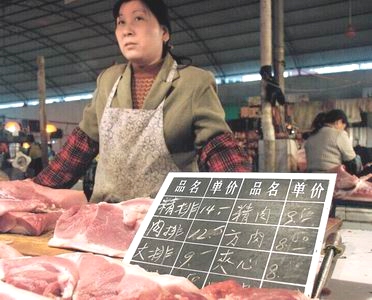
A pork vender waits for customers at a Shanghai Wet
market on Nov. 17. Local Pork prices have increased about 13 percent from a year
ago. China's central bank recently raised its benchmark interest rates for the
first time in nine years. The rise comes as the government struggles to curb
investment that has pushed economic growth to more than 9 percent a year and
inflation to a seven-year high.(Photo: Shanghai Daily)
Chinese banking policy-makers say the interest rate increase was introduced
to deal with some contradictions and problems in economic and financial
operations as macro-economic control measures begin to produce some positive
results. The interest rate hike will also have a positive effect on many
ordinary Chinese.
For ordinary Chinese citizens who have deposited most of their savings in
banks, the interest rate hike of 0.27 percentage points is good news because the
adjustments will help boost interest returns. Mid-to long-term deposit interest
rates were raised by a larger amount than short-term rates.
Zhong Wei, researcher of Int'l Finance Research Center, Chinese Academy of
Social Sciences, said, "The interest rate hike is a clear signal that consumer
prices that have been running at rather high levels in recent months may well
begin to cool down. Citizens who are concerned about trends in the consumer
price index will see a slow growth rate and possibly even a reduction. This is
the positive side of an interest rate increase."
But an increase in basic interest rates may have a negative impact on people
who are buying their houses or cars with a mortgage or loan from the bank. They
will now have to pay a higher rate of interest, and those with a 15 to 30 year
mortgage will be the worst affected.
The central bank also scrapped the ceiling on lending rates that a bank can
charge over mid and long term loans to small and medium-sized enterprises and
private firms. Experts said the move may further boost the fledging sector and
create more jobs.



